

Tips for Researching Companies. Janet Hindle, our Careers Information Adviser, provides some tips on how to research companies for the application process.
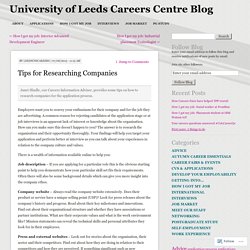
Employers want you to convey your enthusiasm for their company and for the job they are advertising. A common reason for rejecting candidates at the application stage or at job interviews is an apparent lack of interest or knowledge about the organisation. How to research a company: top tips on gathering information about employers. Researching a company doesn't just prove to an employer you're enthusiastic about the opportunity.
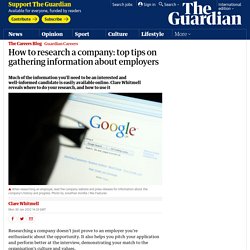
It also helps you pitch your application and perform better at the interview, demonstrating your match to the organisation's culture and values. In 'How I landed a place on HSBC's graduate programme', Belal Kulasy said: "I made sure I knew exactly what the bank valued and how it operates, and I tried to match these values to the experiences that I had. This showed the company that I would fit well within their organisation. " Much of the information you'll need to be an interested and well-informed candidate is easily available online. Employer hubs. The Times Top 100 Graduate Employers 2016-2017. The Sunday Times 100 Best Companies. Welcome to The Sunday Times 100 Best Companies to Work For.

This is the 16th annual survey and ranking of the cream of Britain’s employers, and its appearance each year is a high-profile event in the nation’s business calendar. The data-gathering and analysis used across all sectors are extensive. It’s the staff themselves who fill in the anonymous surveys from which the scores are compiled — a total of 241,361 people filled out questionnaires for this year’s lists — so we’re getting opinions about their bosses, their working conditions and their employer’s values direct from the people whose hard work builds the success of their business, whether they’re lawyers, mechanics or shop assistants. And once a company is on the list, they have to work to stay there. In all 925, firms registered to take part in this year’s surveys and there are 79 new entries, displacing those who didn’t make the grade this time.
Our lists honour: TheJobCrowd. The results of the Top Companies For Graduates To Work For in 2016/17 are out!
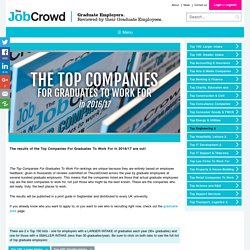
The Top Companies For Graduates To Work For rankings are unique because they are entirely based on employee feedback: given in thousands of reviews submitted on TheJobCrowd across the year by graduate employees at several hundred graduate employers. This means that the companies listed are those that actual graduate employees say are the best companies to work for, not just those who might be the best known. These are the companies who are really, truly, the best places to work. Choosing a prospective employer. Despite the fact that the job market is a tough place to be in at the moment, it's really important to carefully consider whether a prospective employer is the right choice for you.

In this article, I have outlined some of the key factors to consider when choosing an employer. You might consider some points before deciding to apply for a role, so as to avoid wasting your time on unsuitable positions, but all factors set out below should be considered before you decide to accept an offer. Your choice of employer can make a significant impact on your longer term career progression as well as your personal development and job satisfaction. Remuneration: For many, the main motivation is money. If your role is target driven with target based incentives or commission, determine what your targets will be, when bonuses or commission will be paid and how they're structured. Benefits: Most companies will offer some benefits including health insurance and life assurance. Training and development: InLeeds Day 2018. Great Place to Work® UK - Building and recognising successful workplaces.
Ethical employers. Environmental and social values in the workplace have never been more important as an increasing number of graduates choose ethical careers.
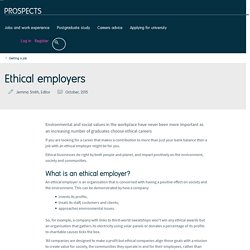
How to choose an ethical employer. In this article, the experts at Graduate Prospects, the UK's official graduate careers website, give advice for finding an ‘ethical’ employer – a company with responsible policies about the environment and its employees.

Environmental and social values in the workplace are more important than ever, as a growing number of graduates are actively choosing ethical careers. If you are looking for a career that makes a contribution to more than just your bank balance, then a job with an ethical employer might be for you. What is an ethical employer? An ethical employer is an organisation that aims to have a positive effect on society and the environment. This shows in how a company: As you can see, ethics can be defined in different ways – a company might look after the welfare of factory staff, for example, but produce materials that damage the environment. Ethical employers. How I got my job in a tech startup. Sadie Connors graduated from Leeds in 2012 with a BA in Business Management and is now Head of Key Accounts at Headbox, an online marketplace for events and meeting venues.

In this post she outlines the path she took to her current role and shares her tips for other students and graduates. What does your role entail? I work at a London tech startup called HeadBox as Head of Key Accounts, looking after a team of Junior and Senior Account Managers. HeadBox is the UK’s first online marketplace for creative off-site, meeting and event spaces so we’re constantly having to keep up to date with the latest event and venue trends. My team and I work diligently to nurture relationships with large corporate clients, managing all of their event space needs. Smaller businesses - Student home, The University of York. I quickly realised that by working in the heart of this small business, my work was guaranteed to be incredibly varied.
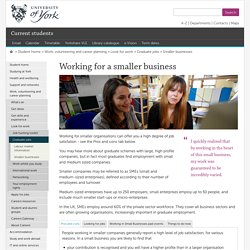
Working for smaller organisations can offer you a high degree of job satisfation - see the Pros and cons tab below. You may hear more about graduate schemes with large, high profile companies, but in fact most graduates find employment with small and medium sized companies. Smaller companies may be referred to as SMEs (small and medium-sized enterprises), defined according to their number of employees and turnover.
Medium-sized enterprises have up to 250 employers; small enterprises employ up to 50 people, and include much smaller start-ups or micro-enterprises. In the UK, SMEs employ around 60% of the private sector workforce. WorkingforSmallOrganisations. My Plus Students' Club. SmallerBusinessandGraduateLabourMarket. Smaller Businesses Research Nov. Search Tips for Market Reports. Cookies on the Key Note website We use cookies to ensure that we give you the best experience on our website.
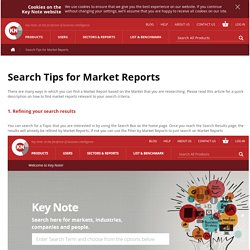
If you continue without changing your settings, we'll assume that you are happy to receive all cookies on our site.